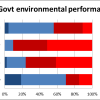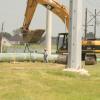One year to go until BC’s next election - what role will defending our natural environment play? Read on to see what the polling is telling us, and to share your ideas in keeping the environment front and centre in the lead up to the election.
Environmental Law Alert Blog
Through our Environmental Law Alert blog, West Coast keeps you up to date on the latest developments and issues in environmental law. This includes:
- proposed changes to the law that will weaken, or strengthen, environmental protection;
- stories and situations where existing environmental laws are failing to protect the environment; and
- emerging legal strategies that could be used to protect our environment.
If you have an environmental story that we should hear about, please e-mail Andrew Gage. We welcome your comments on any of the posts to this blog – but please keep in mind our policies on comments.
Rarely does environmental assessment get to be sexy. While environmental assessment (EA) processes and decisions have been increasingly subject to lawsuits, criticism and protests, the target of dissent is usually either the project (say,
Momentum is growing to get habitat protection reinstated into the federal Fisheries Act through this petition.
To the Canadian government: Consider all greenhouse gas emissions from oil and gas projects
Fish matter to Canadians. Fish habitat, called the “bedrock” of fisheries by Fisheries and Oceans Canada (DFO), matters. And so the law to protect fish and their habitat reallymatters.
Last November, in a federally-unprecedented move, Prime Minister Trudeau made public his mandate letters to Canada’s new Cabinet.
Good news and bad news on the environmental enforcement front from a recent BC government announcement on improving tools for Mines Act enforcement.
The empty NEB hearing room was a stark contrast to the public protesting outside. Photos by Eugene Kung.
West Coast has previously suggested that, in spite of the Province of British Columbia’s “tough talk” on oil pipelines, it has been trying to pass the decision-making buck to the federal government’s National Energy Board (N








